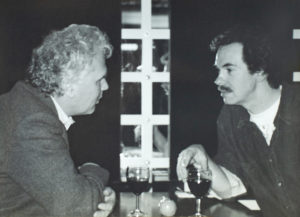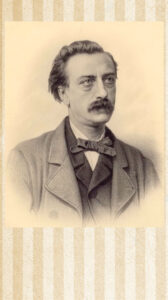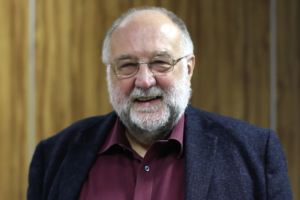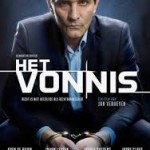Ik vind aan alle uitersten iets aantrekkelijks. Adriaan van Dis over reizen, schrijven en een kolonie van de ziel
BZZLLETIN – April 1992.
Als ik bijvoorbeeld Nathan Sid, Zilver of Indische duinen lees, denk ik: Oscar Wilde had gelijk toen hij zei: An unhappy childhood is a writer’s gold mine. Als die uitspraak niet al bestond, had jij hem kunnen bedenken.
Ik heb een heel merkwaardige jeugd gehad. En hoe ouder ik word, hoe meer ik dat besef, maar daar moet ik maar op een andere manier vorm aan geven dan door een klagerig boek over mijn jeugd te schrijven. Ik ben heel, heel veel geslagen als kind, door mijn vader. Daar kon hij niets aan doen, hij kwam uit een kamp, van de Sumatra-spoorweg, en hij kon eigenlijk alleen nog maar treiteren. En dat is die man niet eens kwalijk te nemen. Het zijn heel rare gebeurtenissen. Het heeft je beslist gevormd, en misvormd, en daar moet je dan maar mee leven. Maar het is wel iets wat heel sterk aanwezig is. Het was een kille jeugd en ik heb daar een groot gevoel van eenzaamheid aan overgehouden. En dat gevoel van eenzaamheid heb ik nog. Dat gaat ook niet van me af. Niet dat die eenzaamheid beklagenswaardig is, dat is gewoon een staat van de ziel. Eenzaam maar niet alleen.
Komt daar ook je reisdrift uit voort?
Ik ben een verwend kind, in die zin dat ik behoor tot de generatie voor wie de wereld open lag toen we 17, 18, 19 jaar oud waren. De tijd dat je voor een appel en een ei de wereld rond kon. Dus ik maakte de grand tour van de hippiegeneratie: richting India, negen maanden weg voor fl. 1.800,-. Maar ik ben nooit tot India gekomen, want in Afghanistan liep ik geheel leeg aan amoebe-dysenterie.
Hoe moeten we jou in de hippietijd voorstellen?
Als een kortgeknipt ventje. Niet met lang haar. Ik had namelijk maar één streven onderweg, dat was: me schoon houden. Ik zag veel mensen die met bonte broeken en een stukje Perzisch kleed als stoplap op de knie door het land gingen, en ik vond dat toen al – en dat vind ik nog – niet erg getuigen van respect voor de mensen van de landen waar je komt. Die hebben een bepaald beeld – voor een deel een cliché – van hoe die buitenlander of westerling eruit moet zien. Er is een Turks spreekwoord – dat kende ik toen al -, dat luidt: ‘lange haren, kleine hersens’. Ik vond dat er wat respect tegenover moest staan van schone nagels en een schoon overhemd, alleen al omdat je zomaar in vreemde culturen binnendrong en toch vaak gebruik maakte van de gastvrijheid van die mensen, want je kwam in dorpen waar niet één behoorlijke herberg was en je werd altijd overal gehuisvest. Dus ik ging schrobbend en wassend door het land.
Je gaat toch niet op wereldreis om bij vreemde volken aan een beeld te voldoen dat ze hebben van westerlingen?
Neem nou bijvoorbeeld Afrika. Daar zijn de mensen over het algemeen vrij conservatief. Dat is misschien een erfenis van het koloniale verleden, maar ze vinden het heel vervelend als daar witte mensen op blote voeten door de stad gaan. En als ze dat vervelend vinden, dan pas ik mij aan. Want als reiziger ben ik er niet om mijn stempel op hen te drukken maar, ik zou bijna zeggen, als een stampertje dat bevrucht wil worden ga ik door een samenleving heen.
Dat bevrucht worden kan door zo veel mogelijk vreemde invloeden op te doen, zo veel mogelijk te luisteren, zo veel mogelijk te begrijpen. Dus ook zo neutraal mogelijk te reizen.
Zoals Simon Carmiggelt in Amsterdam altijd liep in een regenjas van Kreymborg en de meest non-descripte schoenen en broek en bril, en dus overal kon aanschuiven, zo reis ik ook. Ik zie er altijd heel onopvallend uit. Ik ontmoette veel te veel reizigers die alleen maar geïnteresseerd waren in het feit dat ze in Katmandoe geweest waren, stoned on one dollar a day. Want vergeet niet, die reis, die grand tour, dat was natuurlijk voortdurend: dáár moet je slapen, dáár is het goedkoop. Dus iedereen ging naar de Pudding Shop in Istanboel. En als je daar zat, hoorde je weer dat je in Teheran in Amir Kabir, dat was een bepaalde volkswijk, zo goed kon slapen boven een bandenfabriek, want daar kostte het maar 50 cent per nacht. En zo had iedereen dezelfde adressen.
Maar tegelijkertijd wilde je je van die meute onderscheiden, en dat was bij mij doordat ik gewoon wel naar de kapper ging. Heel betrekkelijk, hoor. Kijk, ten eerste ging ik natuurlijk helemaal niet op reis om vreemde volken te ontmoeten. Ik ging op reis om weg te blijven, omdat ik hoogst ongelukkig was. ‘Dag vader, moeder, knekelhuis, ik keer nooit weerom.’ En ergens in den vreemde zou iemand een hand op mijn schouder leggen en zeggen: jongen, ik zie wat in jou, en ik zou misschien wel een miljonair worden in India of een prinses trouwen of in Japan een zaak beginnen. Maar hier had ik het wel gezien. Ik studeerde Nederlands en wat moest ik doen? Gotisch! Wat moest ik doen? Zinnen ontleden! En boeken lezen? Ja, een verplichte lijst. Gruwelijk vond ik het.
Multatuli online
Multatuli – pseudoniem van Eduard Douwes Dekker (1820-1887) – wordt beschouwd als de belangrijkste schrijver uit het Nederlands taalgebied. Zijn invloed op de Nederlandse literatuur, de koloniale politiek, het feminisme en de arbeidersbeweging is baanbrekend geweest. Het Multatuli Genootschap/Stichting Multatuli Huis wil de belangstelling voor deze schrijver en denker levend houden door op multatuli.online zijn volledige werk en correspondentie en alle documenten (zoals teksten, afbeeldingen, archivalia) die op hem betrekking hebben digitaal en in samenhang te publiceren. De website is bestemd voor belangstellenden en onderzoekers maar ook voor wie hier kennismaakt met Multatuli.
De realisering van dit project zal stapsgewijs plaatsvinden. Op dit moment zijn alle zelfstandige publicaties van Multatuli aanwezig, alle bewaard gebleven correspondentie (ca. 5000 brieven), een biografie (door Dik van der Meulen) en het complete voor deze website gedigitaliseerde Multatuli Archief (eigendom van het Multatuli Genootschap en bewaard door Allard Pierson, De Collecties van de Universiteit van Amsterdam).
Daarnaast bevat de website een Multatuli Encyclopedie, een Multatuli Atlas, een Multatuli Lexicon en toegang tot een ruime hoeveelheid secundaire literatuur. Waar mogelijk wordt gewezen naar eerder gedigitaliseerde werken en documentatie, zoals te vinden bij de Koninklijke Bibliotheek (de Digitale Bibliotheek voor de Nederlandse Letteren en Delpher) en het Huygens Instituut.
Het colofon vermeldt alle personen en instellingen die tot nu toe een bijdrage hebben geleverd. Om een zo compleet mogelijk beeld van Multatuli’s werk en levensloop tot stand te brengen kunnen we de hulp van kenners en geïnteresseerden gebruiken. Wie over documenten – brieven, beeldmateriaal of secundaire literatuur – beschikt die hier niet mogen ontbreken of wie anderszins een bijdrage wil leveren aan multatuli.online (financieel of in natura), wordt van harte uitgenodigd om zich te melden bij de redactie van de website. Ook onjuistheden of suggesties voor verbetering kunnen aan de redactie worden doorgegeven.
Deze website is een initiatief van het Multatuli Genootschap en de Stichting Multatuli Huis. Door (fiscaal vriendelijk) donateur te worden ondersteunt u het werk van het genootschap en de stichting en verzekert u de instandhouding van deze website.
Bovenaan iedere pagina van deze website worden delen van de Multatuli Collectie getoond – brieven, documenten, manuscripten, foto’s, afbeeldingen en meer – om een indruk te geven van de rijkdom en de verscheidenheid van die collectie.
Bezoek de site: https://multatuli.online/home
Does the UK Need the EU? An Interview With Malcolm Sawyer
What was Brexit all about? What will its most likely consequences for UK, EU, and the world economy at large? Renowned British economist Malcolm Sawyer, Emeritus Professor of Economics at Leeds University, UK, discusses these and other related issues in an exclusive interview below with C. J. Polychroniou.
C. J. Polychroniou:Brexit has happened. The UK has gotten a divorce from the European Union (EU), after being a member for 47 years. Is this a cultural and political revolution?
Malcolm Sawyer: As of 11pm. (UK time) on 31st January 2020, the UK is no longer a member of the EU, and as such does not participate in the political deliberations of the EU (e.g. no longer any UK members of the European Parliament, UK government ministers do not attend meetings of council of ministers). However, during what is termed a transition period, intended to be completed by 31st December this year, very little has changed in the economic and social relationships between the UK and the EU. Trade continues to take place on the same terms as before, the free movement of labour between countries continues, etc. etc.. The economic effects of UK’s leaving of the EU are yet to be felt, e.g. those from changes in the trading arrangements. To date, there have been effects of the prospects of Brexit: the sterling exchange rate declined sharply shortly after the referendum from which it has not yet fully recovered, and investment has been subdued through uncertainty of the future relationships.
The referendum result was 52/48 in favour of leave over remain, and opinion polls since the referendum have tended to find some, albeit small, movement in opinion towards remain. The general election result of December 2019 resulted in a large Parliamentary majority for the Conservative government with Boris Johnson as Prime Minister, but based on a 43 per cent share of the national vote. The main political parties against Brexit without a further referendum, and against what is often termed a ‘hard Brexit’ (which is now the probable outcome) secured 52 per cent of the national vote.
At the present time, very little has changed in the day-to-day relationships between the UK and the EU. Trade relationships, movement of peoples etc will be decided upon over the next few months. It remains to be seen how co-operative will be the future relationships between the UK and the EU – much of the Brexit campaign has been based on hostility and suspicion of the EU, which undermine future co-operation. Brexit and the campaigns surrounding it have shown up deep divisions within British society.
C. J. Polychroniou: What are the implications of Brexit for the future of Great Britain, the EU, and the world economy at large?
Malcolm Sawyer: Future of UK. The result of the referendum (2016 on remain or leave the EU) revealed significant differences between age groups (old more likely to vote leave than the young), and geographical (cities more likely to vote remain than towns and rural areas). There were also differences between the constituent nations of the UK – England and Wales both voted to leave, and Scotland and Northern Ireland to remain.
There are forces which could propel a break-up of the United Kingdom with Scotland becoming an independent nation and Northern Ireland re-unified with Ireland. The pressures for independence in Scotland are enhanced by the UK leaving the EU, with a Scottish National Party (SNP) in power in Scotland (albeit as a minority government) continuing to push for a second referendum on Scottish independence. A majority of members of the Scottish Parliament favour independence (SNP plus Scottish Green Party) and recent opinion polls put support for independence slightly in the lead.
Max Brod On Franz Kafka (English Subtitles)
This is an interview with Max Brod, Kafka’s longtime friend and literary executor.
After Kafka’s death, Brod refused to comply with Kafka’s instructions to burn most of his work, instead seeing many of Kafka’s texts to first publication.
James Baldwin Debates William F. Buckley (1965)
The legendary debate that laid down US political lines on race, justice and history
In 1965 at the University of Cambridge, two of the foremost American intellectuals were challenged with the question: ‘Has the American Dream been achieved at the expense of the American Negro?’ From William F Buckley’s highly stylised posturing and pointing, to James Baldwin’s melodious rhetorical flourishes and memorable scowls, what’s become known as the ‘Baldwin-Buckley Debate’ now stands as one of the archetypal articulations of the dividing line between US progressives and conservatives on questions of race, justice and history. Baldwin, the famed African-American writer, whose reputation as a progressive social critic and visionary Civil Rights activist has only risen in the intervening decades, argues that the very foundation of US society is built on the dehumanisation of its African-American population. Meanwhile, Buckley, the leading US conservative intellectual of the period, argues that African Americans would be best served by exploiting their country’s many freedoms and opportunities, rather than pointing a collective finger at discriminatory structures and institutions. In both cases, their positions presage contemporary divisive debates in the US, though one wonders whether such an event could happen in today’s political environment.
While usually reduced to short clips, the full hour-long debate – presented here in its entirety – is a remarkable historical document in its own right. Conducted in front of a large, almost entirely white and predominantly male audience at the Cambridge Union, the encounter offers a sense of campus intellectual life in the mid-1960s through the atmosphere in the room, the things that made people laugh, and the particular references made by the debaters. After the always eloquent Baldwin evokes his personal experience to describe a perpetually disorienting and demeaning existence for African Americans, Buckley responds with facts and figures – as well as an ad hominem shot at Baldwin’s speaking voice – to argue that there’s an American Dream available to all those who would pursue it. In the end, Baldwin prevailed, earning an ardent standing ovation and a landslide victory in the Union’s vote on the motion raised.
From: https://aeon.co/the-legendary-debate-that-laid-down-us-political-lines-on-race-justice-and-history
Noam Chomsky: Sanders Threatens The Establishment By Inspiring Popular Movements
The impeachment trial of Donald Trump for power abuses is winding down, with his acquittal all but ensured when the Senate reconvenes on Wednesday to vote on the articles of impeachment. Yet, his real crimes continue to receive scant attention, and it is Sen. Bernie Sanders who is regarded by the political establishment as the most dangerous politician because of his commitment to a just and equitable social order and a sustainable future. Meanwhile, the conclusion of the Davos meeting in January demonstrated the global elites’ ongoing commitment to unimpeded planetary destruction.
This is indeed the state of the contemporary U.S. political environment, as the great public intellectual Noam Chomsky points out in this exclusive interview for Truthout.
C.J. Polychroniou: The impeachment trial of Donald Trump isnearlyover, and what a farce it has been — something you had predicted from the start, which is also the reason why you thought that an impeachment inquiry was a rather foolish move on the part of the Democrats. With that in mind, what does this farcical episode tell us about the contemporary state of U.S. politics, and do you anticipate any political fallout in the 2020 election?
Noam Chomsky: It seemed clear from the outset that the impeachment effort could not be serious, and would end up being another gift by the Democrats to Trump, much as the Mueller affair was. Any doubts about its farcical nature were put to rest by its opening spectacle: Supreme Court Chief Justice John Roberts struggling to keep a straight face while swearing in senators who solemnly pledged that they would be unmoved by partisan concerns, and at once proceeded — as everyone know they would — to behave and vote along strictly party lines. Could there be a clearer exhibition of pure farce?
Are the crimes discussed a basis for impeachment? Seems so to me. Has Trump committed vastly more serious crimes? That is hardly debatable. What might be debatable is whether he is indeed the most dangerous criminal in human history (which happens to be my personal view). Hitler had been perhaps the leading candidate for this honor. His goal was to rid the German-run world of Jews, Roma, homosexuals and other“deviants,” along with tens of millions of Slav “Untermenschen.” But Hitler was not dedicated with fervor to destroying the prospects of organized human life on Earth in the not-distant future (along with millions of other species).
Trump is. And those who think he doesn’t know what he’s doing haven’t been looking closely.






